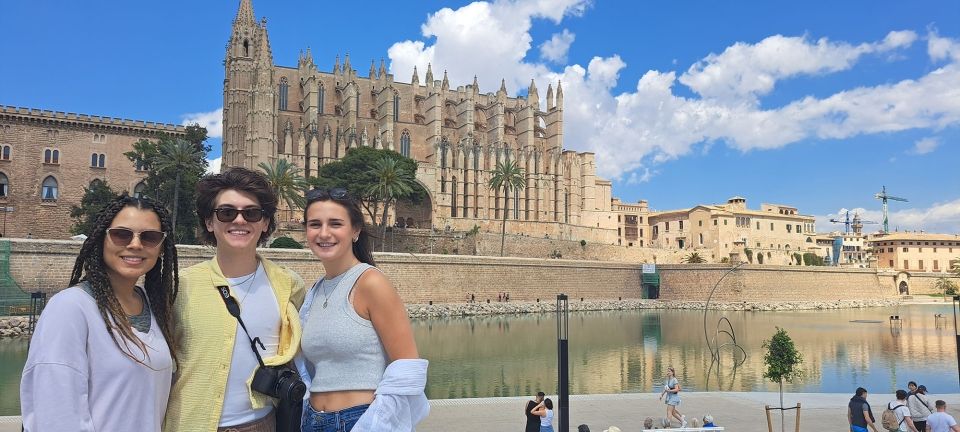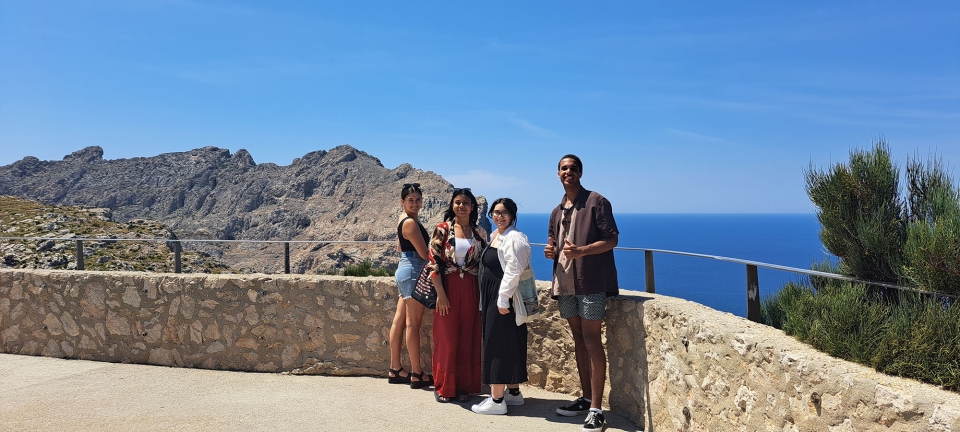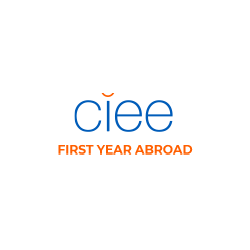Top 10 Questions About First Year Abroad
When you’re considering your options for after high school graduation, whether it be college, getting some professional experience, or considering programs abroad, it’s normal to have a lot of questions. After all, you are planning a major next step in your life!
When it comes to programs abroad, CIEE has got you covered. Let’s dive into some questions we get pretty frequently and provide you with more details to help you prepare for your next step, whatever that may be.
#1. What Are Alternatives to Going to College?
As a soon-to-be or recent high school grad, or a family member or friend of someone in the same position, this question is a great place to start.
A traditional college journey isn’t always the right fit for everyone. Some students might want to travel, others may want to volunteer, and some might even just need a little break after a productive but tiring last few years in high school. No matter what your reasons are for wanting an alternative to the typical U.S. college experience, CIEE has got you covered with our gap year abroad and first year abroad programs.
CIEE’s Gap Year programs are an exciting way to experience the world after high school and help you return to the U.S. feeling refreshed, confident, and better prepared to start college. While you’ll get to explore incredible international destinations and immerse yourself in a new culture, you’ll have structured language learning that will make up about 15 to 20 hours per week.
CIEE’s first year abroad programs are a bit more academically focused. While you’ll get to experience the world after high school, you’ll actually get to start your college career on a first year abroad program and be enrolled as a student at our academic home and school of record, Dean College.
Different than a traditional semester or year on a U.S. university campus, you’ll head straight to one of our 7 amazing international locations, take college-level courses, and earn college credits. You’ll return to the U.S with college experience (and lots of global adventure) under your belt.
#2. How to Plan a Gap Year Abroad and First Year Abroad?

If our alternative options to traditional college intrigue you, we’re sure you have a few more study abroad questions, just like this one.
No matter if you intend on applying to a gap year abroad or a first year abroad, there is some planning involved.
- Step 1: Take a moment to truly think about what you want out of a global experiential opportunity like gap year or first year abroad. It will help you define your goals. Do you want to volunteer abroad? Dive deep into subject matter in a different country? Learn a new language?
- Step 2: Bring in some expert guidance. Talk about your options with parents or guardians, a high school counselor if you haven’t graduated just yet, and feel free to reach out to us. We’re available!
- Step 3: Determine a budget that makes the most sense for you. And keep in mind that first year abroad scholarships are available via CIEE, and financial aid is available through Dean College only.
- Step 4: Research specific gap year programs and first year abroad programs and choose one that makes the most sense for both your personal and academic goals. There are quite a few options, so really examine them closely and chat with us if you have specific questions after browsing!
- Step 5: Get organized and determine the logistics and deadlines for applying and going on one of these exciting CIEE programs.
Now let’s get into some more specific study abroad questions.
#3. Do I Need to Have a Passport or Visa to Participate?
Our shorter answer is yes! Our longer answer includes some additional details: you need a valid passport to join CIEE Gap Year programs and First Year Abroad programs. If you have a passport, make sure it will be valid for six months after your program ends. If you need a new passport or need to renew an existing one, visit the U.S. Department of State website.
Visas are needed if you are spending more than three months in a country and each country has their own specific visa policies. Depending on the program you choose, you may need to get a visa. CIEE will provide you with necessary documentation including:
- Proof of program acceptance
- Confirmation of international health and accident insurance
- Proof of financial means during your stay
Although we’ll provide some of the documents for the visa process, obtaining your visa from a foreign consulate will be your responsibility. CIEE will offer guidance, but you’ll need to provide the consulate with all documents by the necessary deadlines.
#4. What Is Included in a CIEE Program Fee?
CIEE program fees for both gap year and first year abroad programs cover a lot, including:
- Placement with a carefully-screened host family (the only option for gap year) or local residence hall
- Online orientation before leaving the U.S. and in-person orientation upon arrival
- Supervision and support of local staff
- Pre-departure assistance
- CIEE-led educational trips and excursions
- International medical and travel insurance
- 24/7 support and counseling available to students and parents from CIEE headquarters staff
- Access to CIEE Alumni network
Make sure to look at what type of financial assistance is available for your specific CIEE program. This does differ between gap year and first year abroad. As we’ve mentioned, students are eligible for financial aid through Dean College, our academic home and school of record, for first year abroad programs. Students interested in gap year abroad can apply for CIEE discounts. We’re happy to help point you in the right direction.
As the newest program in CIEE’s portfolio, let’s take a closer look at some top first year abroad questions!
#5. What Type of Student Should Go on a First Year Abroad Program?

This is an excellent question, and one we get all the time! Students who are passionate about international education and prioritize global citizenship will thrive on a CIEE First Year Abroad program. While travel is important, those who want to truly immerse themselves in the local culture and gain a deeper global perspective will find the most value in first year abroad.
Not to mention, those who want to thrive academically are also perfect candidates for first year abroad programs. You’ll get to start your college career while embarking on the adventure of a lifetime.
#6. Where Can I Go with CIEE First Year Abroad?
Your CIEE First Year Abroad destination options are incredible:
- Barcelona, Spain
- Berlin, Germany
- Kyoto, Japan
- London, United Kingdom
- Monteverde, Costa Rica
- Rome, Italy
- Sydney, Australia
Picture yourself in Copenhagen’s enchanting Tivoli Gardens, in an ancient teahouse in Kyoto, setting your sights on some of the most world’s most famous art pieces in Paris’s Louvre Museum, or even taking surfing lessons at Sydney’s iconic Bondi Beach. You’re in for an exciting journey.
#7. Will I Receive College Credit for First Year Abroad?
While we’ve briefly mentioned credits, let’s add some context. First things first—yes! You’ll absolutely receive college credit for first year abroad because this program is considered a college study abroad program. All students will enroll in 12-13 semester credit hours through Dean College and receive an official academic transcript outlining courses taken, credit hours earned, and final grades.
It’s important to remember that if you plan on continuing your studies at a different college back in the States, it is up to that specific school to decide whether or not they will issue transfer credit for the courses through Dean College. While first year abroad programs are looked at by admission teams favorably, each institution will apply their own discretion to the process.
#8. What Are My Course Options with CIEE First Year Abroad?

While you go on incredible cultural excursions, you’ll be learning a lot in the classroom, too. After all, a first year abroad experience truly is an immersive, experiential learning program.
You’ll get to choose from a variety of college courses, each worth 3-4 credits:
- Languages: French, German, Italian, Japanese, and Spanish
- Arts: Intro to Studio Art, Music Appreciation, and Art History
- Social Sciences: World History, Cultural Geography, and Intro to Psychology
- Business: Principles of Management, Microeconomics, and Macroeconomics
- Math: Intro to Statistics, College Algebra, and Calculus
- Science: Biology, Chemistry, Physics, and Environmental Science
- Others: English Composition, Computer Science, Digital Photography, and many more!
Read more about our first year abroad academics.
#9. Do I Need to Speak the Local Language?
When you’re on a first year abroad program, you won’t need to speak the local language. All your courses will be taught in English, except for upper-level foreign language courses. It helps if you can speak some of the local language, or if you brush up on common words and phrases ahead of your travels!
#10. Can I Travel on My Own During First Year Abroad?
Absolutely! While you’ll need to prioritize your courses and CIEE-guided cultural excursions, you’ll be able to do some independent exploring during your first year abroad program. Check in with your CIEE center staff before your travels for a rundown on country-specific traveling guidelines.
Now that (most of) your questions are answered about your alternatives to going to college, it’s time to do some real exploring!

